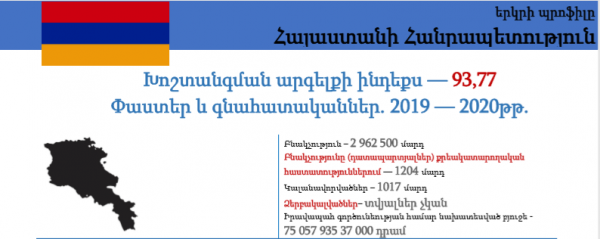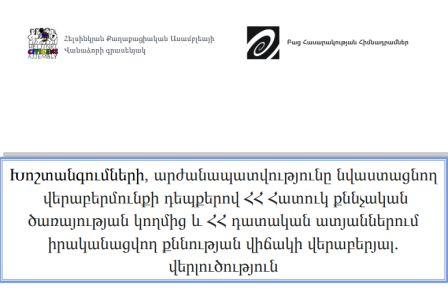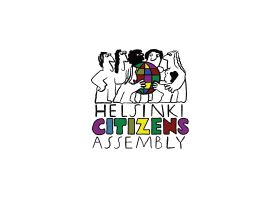Համաթվերը հաշվարկվել են՝ ըստ երկրների։ Ցուցիչները ներառում են խոշտանգումների կանխարգելման և արձագանքման պետական մեխանիզմների և միջոցների, դատական վերահսկողության, ներպետական օրենսդրության մեջ խոշտանգումների արգելքի նորմերի առկայության, պետության կողմից խոշտանգումների արգելքի միջազգային պարտավորությունների կատարման գնահատականները։
Համաթվերը ներկայացված են ԵԱՀԿ տարածաշրջանի ութ երկրների համար՝ Հայաստան, Բելառուս, Ղազախստան, Ղրղզստան, Մոլդովա, Ռուսաստան, Տաջիկստան, Ուկրաինա։
Հայաստանից աշխատանքային խմբում ներգրավված են եղել Հելսինկյան քաղաքացիական ասամբլեայի Վանաձորի գրասենյակը և Հայաստանի Հելսինկյան կոմիտեն։
Համաթվերի մշակման գործընթացում աշխատանքային խմբի ներկայացուցիչները բախվել են մի շարք խնդիրների։ Հայաստանի մասով, օրինակ, տեղեկատվության հավաքագրման խնդիրները վերաբերել են հստակ վիճակագրության բացակայությանը։ Մասնավորապես՝ հստակ չէ, թե խոշտանգումների վերաբերյալ քանի բողոք է ներկայացվել, քանի քրեական գործ է հարուցվել, քանիսն են դատարան ուղարկվել։ Նույն խնդիրը եղել է նաև Ղազախստանում, Ռուսաստանում և Ուկրաինայում։
Հայաստանի մասով որոշակի չէ նաև խոշտանգման գործերով քննիչների ծանրաբեռնվածության աստիճանը։
Համաթվերի այս հրապարակումը պիլոտային է։ Աշխատանքային խումբը նախատեսում է համաթվերի հրապարակումը դարձնել ամենամյա, դրանք կհրապարկվեն ամեն տարի հունիսի 26-ին՝ Խոշտանգումներից տուժած անձանց աջակցության միջազգային օրը։ Հետագայում հետազոտության աշխարհագրությունը կընդլայնվի և կներառի ԵԱՀԿ այլ երկրներ ևս։
Հայաստանի համաթվերի ամբողջական պատկերը՝ ԱՅՍՏԵՂ
Բնօրինակը՝ civicsolidarity.org
Ստորև ներկայացնում ենք ՀՀ-ում խոշտանգումների վերաբերյալ քրեական գործերի վիճակագրական որոշ տվյալներ 2019-ի համար՝ հիմնված Մարդու իրավունքների պաշտպանի տարեկան զեկույցի, Հելսինկյան քաղաքացիական ասամբլեայի Վանաձորի գրասենյակի հարցումների պատասխանների և Դատալեքս համակարգի տվյալների վրա։
Այսպես՝ 2019-ին ՀՀ հատուկ քննչական ծառայությունը խոշտանգման վերաբերյալ 130 գործ է քննել, որոնցից 99-ը հարուցվել են հենց 2019-ին։
ՀՀ քրեական օրենսգրքի 309.1 հոդվածով (Խոշտանգումը) հարուցված 55 գործերից 34-ը կարճվել են, 3-ը՝ ուղարկվել դատարան։

ՀՀ քրեական օրենսգրքի 341-րդ հոդվածի 3-րդ մասով (Դատավորի, դատախազի, քննիչի կամ հետաքննության մարմնի կողմից ցուցմունք կամ բացատրություն կամ կեղծ եզրակացություն տալուն կամ սխալ թարգմանություն կատարելուն հարկադրելը) հոդվածով 2 գործ է քննվել, 2-ն էլ կարճվել է։

ՀՀ քրեական օրենսգրքի 309-րդ հոդվածի (Պաշտոնեական լիազորություններն անցնելը) 2-րդ մասով հարուցված 73 գործերից կարճվել է 40-ը, կասեցվել՝ 10-ը, դատարան է ուղարկվել ընդամենը 2-ը։

2019-ին դատարանը խոշտանգման վերաբերյալ գործերով 3 մեղադրական դատավճիռ է կայացրել, 2 դեպքում համաներում է կիրառվել, մի դեպքում վաղեմության ժամկետներն անցնելու հիմքով են ազատ արձակվել։
Մեկ գործով, չնայած դատարանը կայացրել է արդարացնող վճիռ, սակայն վճիռը բեկանվել է, գործն ուղարկվել նոր քննության։

The indices were calculated according to the countries. The indicators include assessments of state means and mechanisms of prevention of and response to torture, judicial supervision, the existence of torture prohibition norms in domestic legislation, as well as the compliance of the state with the international obligations of torture prevention.
The indices are presented for 8 countries of the OSCE region: Armenia, Belarus, Kazakhstan, Kyrgyzstan, Moldova, Russia, Tajikistan, Ukraine.
Helsinki Citizens’ Assembly – Vanadzor and Armenian Helsinki Committee were involved in the working group from Armenia.
During the development of the indices, representatives of the working group encountered a number of problems. As to the part on Armenia, for example, the problems of collecting information were related to the absence of clear statistics. In particular, it is not clear how many torture complaints were presented, how many criminal cases were initiated and how many of them were sent to Court. The same problem was also encountered in Kazakhstan, Russia and Ukraine.
Besides, the degree of investigators’ workload of torture cases is also not clear in Armenia.
This publication of indices is a pilot one. The working group envisages publishing indices annually on 26 June, i.e. on the International Day in Support of Victims of Torture. Further, the geographical coverage of the research will expand and include other OSCE countries, as well.
The full picture of Armenia’s indices is available HERE
The original is available in civicsolidarity.org
Below we present some statistical data regarding criminal cases on torture in the Republic of Armenia in 2019, based on the annual report of the Human Rights Defender, responses to inquiries by Helsinki Citizens’ Assembly-Vanadzor and the data presented in DataLex system.
Thus, in 2019, the RA Special Investigation Service investigated 130 torture cases, 99 of which were initiated in 2019.
55 cases were initiated under Article 309.1 (Torture) of the RA Criminal Code. 34 of them were discontinued, 6 cases were suspended, 5 cases were attached to other cases, 3 cases were sent to Court, 7 cases are in the preliminary investigation stage.
2 cases were investigated under Article 341 part 3 of the RA Criminal Code (Forcing by the judge, the prosecutor, the investigator or the body of inquiry to give testimony or explanation or a false conclusion or an incorrect translation). Both of the cases were discontinued.
73 cases were initiated under Article 309 (Exceeding official authorities) part 2 of the RA Criminal Code. 40 of them were discontinued, 10 of them were suspended, only 2 cases were sent to Court, 10 cases were attached to other cases, 5 cases were sent to another body, 6 cases are in the preliminary investigation stage.
In 2019, the Court made 3 bills of indictment in the frame of torture cases. In 2 of them, amnesty was applied, and in the third case, they were released on the ground of expiration of the statute of limitations.
Though in one case the Court made a judgment of acquittal, the judgment was overturned and the case was sent for a new investigation.
[:]




